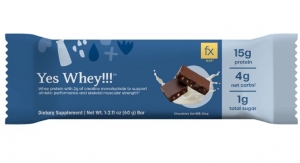02.01.24
Cinnamon supplements may help to reduce blood sugar response in overweight and obese adults with prediabetes, according to a new study appearing in the American Journal of Clinical Nutrition.
While the mechanisms behind cinnamon’s potential blood sugar benefits are unknown, and evidence is fairly mixed regarding whether it can significantly effect blood sugar management in (pre)diabetics, the results of the present study are in line with a review of 16 studies which found that the polyphenol-rich spice has significant effects on glycemic response.
Study Details
The randomized, double-blind, placebo-controlled crossover trial was completed with 18 participants who were overweight or obese, and were found to have prediabetes following a metabolic screening.
Following a two-week run-in period of maintaining a low polyphenol/fiber diet, participants were randomly assigned to take four grams of cinnamon per day or a placebo for four weeks, then undergo a washout period before control and treatment groups switched for an additional four weeks.
During the study, all participants underwent continuous glucose monitoring, and oral glucose tolerance testing took place immediately following ingestion of cinnamon or placebo at four points, to assess any acute effects both at baseline and at the end of each intervention phase.
There were 694 follow-up days with 66,624 glucose observations in total. Compared to placebo, groups taking cinnamon supplements had significantly lower average glucose concentrations, with peaks of 9.56 ± 9.1 mg/dL, compared to 11.73 ± 8.0 mg/dL.
“Cinnamon, a widely available and low-cost supplement, may contribute to better glucose control when added to a diet in people who have obesity-related conditions,” the authors concluded.
Notably, compliance with treatment administration was “excellent,” the authors said, and while cinnamon didn’t have acute effects on postprandial glucose and insulin concentrations, this was consistent with other studies. The results of this study also can’t be generalized to people without overweight/obesity and prediabetes, since both of these conditions being part of the inclusion criteria.
While the mechanisms behind cinnamon’s potential blood sugar benefits are unknown, and evidence is fairly mixed regarding whether it can significantly effect blood sugar management in (pre)diabetics, the results of the present study are in line with a review of 16 studies which found that the polyphenol-rich spice has significant effects on glycemic response.
Study Details
The randomized, double-blind, placebo-controlled crossover trial was completed with 18 participants who were overweight or obese, and were found to have prediabetes following a metabolic screening.
Following a two-week run-in period of maintaining a low polyphenol/fiber diet, participants were randomly assigned to take four grams of cinnamon per day or a placebo for four weeks, then undergo a washout period before control and treatment groups switched for an additional four weeks.
During the study, all participants underwent continuous glucose monitoring, and oral glucose tolerance testing took place immediately following ingestion of cinnamon or placebo at four points, to assess any acute effects both at baseline and at the end of each intervention phase.
There were 694 follow-up days with 66,624 glucose observations in total. Compared to placebo, groups taking cinnamon supplements had significantly lower average glucose concentrations, with peaks of 9.56 ± 9.1 mg/dL, compared to 11.73 ± 8.0 mg/dL.
“Cinnamon, a widely available and low-cost supplement, may contribute to better glucose control when added to a diet in people who have obesity-related conditions,” the authors concluded.
Notably, compliance with treatment administration was “excellent,” the authors said, and while cinnamon didn’t have acute effects on postprandial glucose and insulin concentrations, this was consistent with other studies. The results of this study also can’t be generalized to people without overweight/obesity and prediabetes, since both of these conditions being part of the inclusion criteria.




























